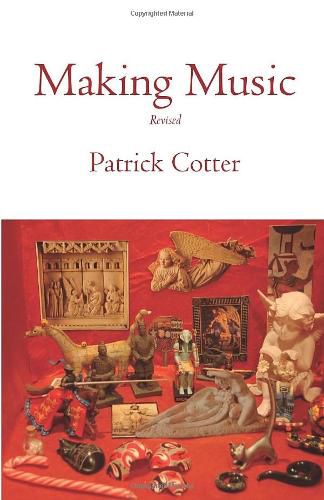Readings Newsletter
Become a Readings Member to make your shopping experience even easier.
Sign in or sign up for free!
You’re not far away from qualifying for FREE standard shipping within Australia
You’ve qualified for FREE standard shipping within Australia
The cart is loading…






Making Music is full of inventive mischievousness and idiosyncratic wit. The humour is dark and an iconoclastic heart beats throughout Cotter's work. The Unembroidered Cloths sends up Yeats's embroidered cloths of heaven by situating us in an "Underworld" where we "waken to find ourselves/ treading on our nightmares". Making Music is also saturated with the presence of "angels". But unlike the glut of angels in American poetry, Cotter's angels are of a different species altogether. In fact, one particular "Angel" has more in common with Hughes's "Crow" than any other celestial being: "Angel failed to pack his feathers on his trip to hell". . A book more of nightmares than dreams, Cotter writes nonetheless that "The undreamt life is not worth living". An anarchic voice in Irish poetry, Cotter's new collection is playful, irreverent, and welcome. - Paul Perry The Irish Times
Angels are both figures of annunciation and fellow-travellers in a pitiable world. They instruct and suffer, telling the poet home truths and collapsing 'slumped colourless on the wardrobe' ('Journal of a Failed Angel Whisperer'), when the burden of mortality that the poet carries becomes too chthonic and full of ectoplasm. Keeping the company of angels might bring grief to any poet, but Cotter is an adroit and knowing artist; his verse is as likely to be soiled by a passing pigeon as enchanted by ethereal beings. He is, after all, a disciple of German poetry. Rilke was Cotter's first angel when he was a youthful poet, though his language become as dark as a cadaver in a page from Gottfried Benn as he matured. Angels in this book have guarded him from the nest of rats below the diaphragm, from decay and corpses. And there are other tones in this collection: the title poem's beautifully paced ironies, the witty excrement in 'Courthouse Steps', as well as the provocative rhetoric of 'On Not Being Kavanagh' and the vulnerable devotion of 'So So.... it is sui generis Cotter, quirky, uncompromising and a roar of colour. - Thomas McCarthy Poetry Ireland Review
Patrick Cotter's angels are not the frothy creations of New Ageists, nor are they the kindly Biblical type - these are the angels of one poet's imagination and he teaches us about them and their ways with a sort of manic glee. He has a gift for creating a rueful narrative voice that milks both sympathy and laughs from the reader. The writing is always finely crafted; it is conversational but learned, seemingly effortless, and is studded everywhere with the poet's vast and unusual vocabulary. He is a modern poet in the best sense of that word and he deserves many, many readers. - Nuala O'Connor Poetry International (San Diego)
$9.00 standard shipping within Australia
FREE standard shipping within Australia for orders over $100.00
Express & International shipping calculated at checkout
Making Music is full of inventive mischievousness and idiosyncratic wit. The humour is dark and an iconoclastic heart beats throughout Cotter's work. The Unembroidered Cloths sends up Yeats's embroidered cloths of heaven by situating us in an "Underworld" where we "waken to find ourselves/ treading on our nightmares". Making Music is also saturated with the presence of "angels". But unlike the glut of angels in American poetry, Cotter's angels are of a different species altogether. In fact, one particular "Angel" has more in common with Hughes's "Crow" than any other celestial being: "Angel failed to pack his feathers on his trip to hell". . A book more of nightmares than dreams, Cotter writes nonetheless that "The undreamt life is not worth living". An anarchic voice in Irish poetry, Cotter's new collection is playful, irreverent, and welcome. - Paul Perry The Irish Times
Angels are both figures of annunciation and fellow-travellers in a pitiable world. They instruct and suffer, telling the poet home truths and collapsing 'slumped colourless on the wardrobe' ('Journal of a Failed Angel Whisperer'), when the burden of mortality that the poet carries becomes too chthonic and full of ectoplasm. Keeping the company of angels might bring grief to any poet, but Cotter is an adroit and knowing artist; his verse is as likely to be soiled by a passing pigeon as enchanted by ethereal beings. He is, after all, a disciple of German poetry. Rilke was Cotter's first angel when he was a youthful poet, though his language become as dark as a cadaver in a page from Gottfried Benn as he matured. Angels in this book have guarded him from the nest of rats below the diaphragm, from decay and corpses. And there are other tones in this collection: the title poem's beautifully paced ironies, the witty excrement in 'Courthouse Steps', as well as the provocative rhetoric of 'On Not Being Kavanagh' and the vulnerable devotion of 'So So.... it is sui generis Cotter, quirky, uncompromising and a roar of colour. - Thomas McCarthy Poetry Ireland Review
Patrick Cotter's angels are not the frothy creations of New Ageists, nor are they the kindly Biblical type - these are the angels of one poet's imagination and he teaches us about them and their ways with a sort of manic glee. He has a gift for creating a rueful narrative voice that milks both sympathy and laughs from the reader. The writing is always finely crafted; it is conversational but learned, seemingly effortless, and is studded everywhere with the poet's vast and unusual vocabulary. He is a modern poet in the best sense of that word and he deserves many, many readers. - Nuala O'Connor Poetry International (San Diego)